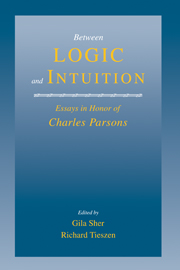Book contents
- Frontmatter
- Contents
- Preface
- I LOGIC
- II INTUITION
- Immediacy and the Birth of Reference in Kant: The Case for Space
- Geometry, Construction and Intuition in Kant and his Successors
- Parsons on Mathematical Intuition and Obviousness
- Gödel and Quine on Meaning and Mathematics
- III NUMBERS, SETS AND CLASSES
- Name Index
Immediacy and the Birth of Reference in Kant: The Case for Space
Published online by Cambridge University Press: 02 December 2009
- Frontmatter
- Contents
- Preface
- I LOGIC
- II INTUITION
- Immediacy and the Birth of Reference in Kant: The Case for Space
- Geometry, Construction and Intuition in Kant and his Successors
- Parsons on Mathematical Intuition and Obviousness
- Gödel and Quine on Meaning and Mathematics
- III NUMBERS, SETS AND CLASSES
- Name Index
Summary
All cognition, that is, all presentations consciously referred to an object, are either intuitions or concepts. Intuition is a singular presentation (repraesentatio singularis), the concept is a general (repraesentatio per notas communes) or reflected presentation (repraesentatio discursiva).
(Jäsche Logic, §1)In whatever manner and by whatever means a cognition may relate to objects, intuition is that through which it is in immediate relation to them, and to which all thought as a means is directed. But intuition takes place only in so far as the object is given to us.
(Critique of Pure Reason, A19/B33)Space is not a discursive or, as we say, general concept of relations of things in general, but a pure intuition.
(A25/B39)Charles Parsons has taught us that the Kantian conception of intuition is a multi-faceted notion and that this complexity affects Kant's philosophy of mathematics. In this essay, I focus on these two lessons, but also broaden them a bit. Specifically, I have three goals:
Parsons has taught us that the notion of immediacy – which he interprets phenomenologically – must be separately added to the traditional criterion of singularity that has been stressed by all commentators on Kant's definition of intuition. In this essay, however, I shall point out that Kant offers not two but three marks of human intuition: There is singularity; there is, as Parsons insists, immediacy; and there is also something I shall call “reference.” Kant calls it the “object givingness” of intuition. It is there quite clearly at A19.
[…]
- Type
- Chapter
- Information
- Between Logic and IntuitionEssays in Honor of Charles Parsons, pp. 155 - 185Publisher: Cambridge University PressPrint publication year: 2000
- 4
- Cited by



